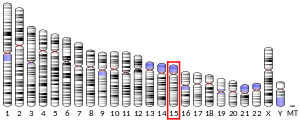BMF (gene)
Bcl-2-modifying factor is a protein that in humans is encoded by the BMF gene.[5][6]
The protein encoded by this gene belongs to the BCL2 protein family. BCL2 family members form hetero- or homodimers and act as anti- or pro-apoptotic regulators that are involved in a wide variety of cellular activities. This protein contains a single BCL2 homology domain 3 (BH3), and has been shown to bind BCL2 proteins and function as an apoptotic activator. This protein is found to be sequestered to myosin V motors by its association with dynein light chain 2, which may be important for sensing intracellular damage and triggering apoptosis. Alternatively spliced transcript variants encoding different isoforms have been identified.[6]
Interactions
BMF (gene) has been shown to interact with Bcl-2[5] and DYNLL2.[5][7]
References
- ^ a b c GRCh38: Ensembl release 89: ENSG00000104081 – Ensembl, May 2017
- ^ a b c GRCm38: Ensembl release 89: ENSMUSG00000040093 – Ensembl, May 2017
- ^ "Human PubMed Reference:". National Center for Biotechnology Information, U.S. National Library of Medicine.
- ^ "Mouse PubMed Reference:". National Center for Biotechnology Information, U.S. National Library of Medicine.
- ^ a b c Puthalakath H, Villunger A, O'Reilly LA, Beaumont JG, Coultas L, Cheney RE, Huang DC, Strasser A (Sep 2001). "Bmf: a proapoptotic BH3-only protein regulated by interaction with the myosin V actin motor complex, activated by anoikis". Science. 293 (5536): 1829–32. Bibcode:2001Sci...293.1829P. doi:10.1126/science.1062257. PMID 11546872. S2CID 5638023.
- ^ a b "Entrez Gene: BMF Bcl2 modifying factor".
- ^ Day, Catherine L; Puthalakath Hamsa; Skea Gretchen; Strasser Andreas; Barsukov Igor; Lian Lu-Yun; Huang David C S; Hinds Mark G (Feb 2004). "Localization of dynein light chains 1 and 2 and their pro-apoptotic ligands". Biochem. J. 377 (Pt 3). England: 597–605. doi:10.1042/BJ20031251. PMC 1223895. PMID 14561217.
Further reading
- Hattori A, Okumura K, Nagase T, et al. (2001). "Characterization of long cDNA clones from human adult spleen". DNA Res. 7 (6): 357–66. doi:10.1093/dnares/7.6.357. PMID 11214971.
- Strausberg RL, Feingold EA, Grouse LH, et al. (2003). "Generation and initial analysis of more than 15,000 full-length human and mouse cDNA sequences". Proc. Natl. Acad. Sci. U.S.A. 99 (26): 16899–903. Bibcode:2002PNAS...9916899M. doi:10.1073/pnas.242603899. PMC 139241. PMID 12477932.
- Lei K, Davis RJ (2003). "JNK phosphorylation of Bim-related members of the Bcl2 family induces Bax-dependent apoptosis". Proc. Natl. Acad. Sci. U.S.A. 100 (5): 2432–7. Bibcode:2003PNAS..100.2432L. doi:10.1073/pnas.0438011100. PMC 151358. PMID 12591950.
- Day CL, Puthalakath H, Skea G, et al. (2004). "Localization of dynein light chains 1 and 2 and their pro-apoptotic ligands". Biochem. J. 377 (Pt 3): 597–605. doi:10.1042/BJ20031251. PMC 1223895. PMID 14561217.
- Morales AA, Olsson A, Celsing F, et al. (2004). "Expression and transcriptional regulation of functionally distinct Bmf isoforms in B-chronic lymphocytic leukemia cells". Leukemia. 18 (1): 41–7. doi:10.1038/sj.leu.2403183. PMID 14574334.
- Ota T, Suzuki Y, Nishikawa T, et al. (2004). "Complete sequencing and characterization of 21,243 full-length human cDNAs". Nat. Genet. 36 (1): 40–5. doi:10.1038/ng1285. PMID 14702039.
- Gerhard DS, Wagner L, Feingold EA, et al. (2004). "The status, quality, and expansion of the NIH full-length cDNA project: the Mammalian Gene Collection (MGC)". Genome Res. 14 (10B): 2121–7. doi:10.1101/gr.2596504. PMC 528928. PMID 15489334.
- Chen L, Willis SN, Wei A, et al. (2005). "Differential targeting of prosurvival Bcl-2 proteins by their BH3-only ligands allows complementary apoptotic function". Mol. Cell. 17 (3): 393–403. doi:10.1016/j.molcel.2004.12.030. PMID 15694340.
- Kuwana T, Bouchier-Hayes L, Chipuk JE, et al. (2005). "BH3 domains of BH3-only proteins differentially regulate Bax-mediated mitochondrial membrane permeabilization both directly and indirectly". Mol. Cell. 17 (4): 525–35. doi:10.1016/j.molcel.2005.02.003. PMID 15721256.
- Soung YH, Lee JW, Park WS, et al. (2006). "BH3 domain mutation of proapoptotic genes Bad, Bmf and Bcl-G is rare in transitional cell carcinomas of the urinary bladder". Pathology. 38 (1): 33–4. doi:10.1080/00313020500455811. PMID 16484005. S2CID 32022854.
- Zhang Y, Adachi M, Kawamura R, et al. (2007). "Bmf contributes to histone deacetylase inhibitor-mediated enhancing effects on apoptosis after ionizing radiation". Apoptosis. 11 (8): 1349–57. doi:10.1007/s10495-006-8266-1. PMID 16830229. S2CID 19085805.
- Schmelzle T, Mailleux AA, Overholtzer M, et al. (2007). "Functional role and oncogene-regulated expression of the BH3-only factor Bmf in mammary epithelial anoikis and morphogenesis". Proc. Natl. Acad. Sci. U.S.A. 104 (10): 3787–92. Bibcode:2007PNAS..104.3787S. doi:10.1073/pnas.0700115104. PMC 1820662. PMID 17360431.
- Yoo NJ, Soung YH, Lee SH, et al. (2007). "Mutational analysis of the BH3 domains of proapoptotic Bcl-2 family genes Bad, Bmf and Bcl-G in laryngeal squamous cell carcinomas". Tumori. 93 (2): 195–7. doi:10.1177/030089160709300214. PMID 17557568. S2CID 21247583.
External links
- Human BMF genome location and BMF gene details page in the UCSC Genome Browser.




